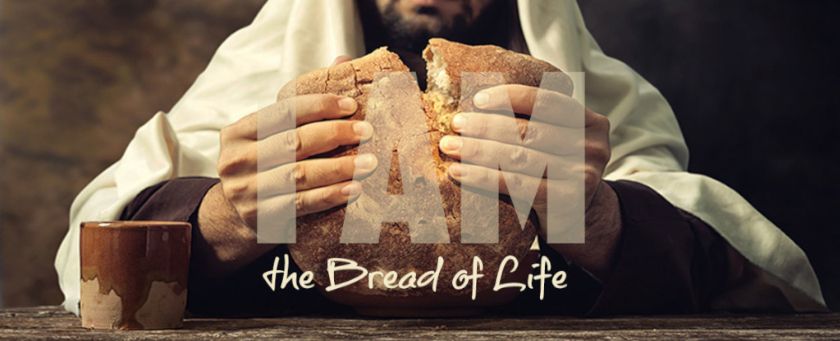Jesus is The Bread of Life
Eighteenth Sunday in Ordinary Time, Year B

(Audio recorded live, 31 July 2021)
Readings:
Ex. 16:2-4, 12-15; Ps. 78; Eph. 4:17, 20-24; Jn. 6:24-35
As we continue our journey through the Bread of Life Discourse in John’s Gospel, I would like to highlight two important points from St. Paul’s Letter to the Ephesians. Last week he encourages the people to preserve the unity of the spirit, bearing with one another through love. Today, he describes how we might accomplish this. First, by avoiding futile thinking and deceitful desires, choosing rather to embrace the truth of Jesus, and second, by letting go of former ways, renewing the spirit of the mind, and putting on the new self. Simply put, St. Paul is encourages us to move beyond former ways of thinking and to embrace Christ.
Jesus encourages the same in today’s Gospel as the people come to him for the wrong reason. They are seeking to satisfy their earthly hunger, failing to realize that the bread Jesus gives is not just food for the stomach, but also food for eternal life. He is inviting them to look beyond the ordinary and see the extraordinary, so that they might embrace the deeper reality of the Bread of Life.
John’s Gospel is unique among the Gospels because it does not contain a narrative for the institution of the Eucharist. Some suggest that since the Gospel was written after all the others, the Johannine community would have been celebrating Eucharist regularly and not needed to include the institution narrative. They were already living it; they had already let go of their former ways and embraced the truth of Jesus. So, John gives us this entire chapter, where Jesus explains the Bread of Life to the people. Just as he broke the bread to distribute it to the people, now he breaks open the Scriptures to nourish our hearts and minds.
The setting is a synagogue in Capernaum, so we might say this is something like a homily given by the Master. The passage Jesus is preaching on is inspired from our Psalm and the account of Moses we heard in the first reading: He gave them bread from heaven to eat. The manna in the desert appeared on the ground every morning for 40 years until the people entered into the Promise Land and then, it ceased. Jesus offers a correction to their statement, however, saying, “[I]t was not Moses who gave the bread from heaven; my Father gives you the true bread from heaven.” The people are comparing Jesus to Moses, but Jesus refocuses their attention on God. The bread that they say Moses gave them was not from Moses; it was from God.
The goal of this discourse is to help the people understand the reality of what Jesus is giving them. It is not bread for a day, like the old adage, “If you give someone a fish, they eat for a day.” Jesus is taking them to the next level by teaching them. “If you teach someone how to fish, they eat for life.” Jesus, through this teaching, reveals himself as the true bread from heaven. He says, “[W]hoever comes to me will never hunger, and whoever believes in me will never thirst.”
So, today, as we we hunger and thirst for the true bread from heaven, may the communion we share renew us in mind, body, and spirit. And may we seek to put aside old ways so we can move forward to achieve our fullest potential: To be fully alive in Christ. To be our truest self.





Share this post
Twitter
Facebook
Pinterest
Email